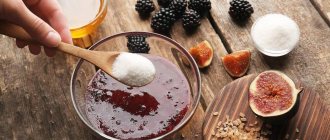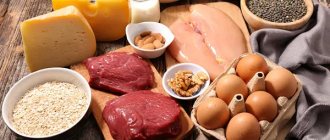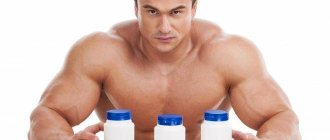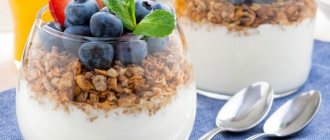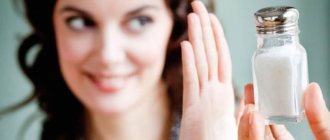Home » Strength and endurance » Isotonic drinks » The benefits and harms of isotonic drinks
Isotonics
Isotonic is a special sports drink for athletes. It increases endurance and accelerates recovery processes in the body. Isotonic drinks contain important vitamins, salts and sugars. During training, the body loses these substances along with fluid, so they must be replenished. If this is not done, the athlete faces dehydration, fever, blood pressure surges, dizziness and muscle cramps.
What is more benefit or harm from isotonics? Let's figure it out.
The composition of isotonics is very simple, but despite this, they are very effective. Regular consumption of these drinks can significantly improve your workout results.
People who are far from sports do not know about the existence of such healthy drinks, although they are in great demand in many countries. They are purchased by athletes and people who want to lose weight. Let's figure out whether energy drinks are really as healthy as the advertising claims, and can you make them yourself? The world of nutritional sports supplements is very vast and largely hidden from the uninitiated. The most popular products from this sports set are isotonics - special liquids that restore energy, vitamin and mineral reserves in the body. In the USA and Western European countries, it is customary to buy such drinks in a ready-made form in the store, fortunately manufacturers offer a wide range to suit every taste and the most sophisticated needs. In Russia, the “model range” of isotonic drinks is extremely scarce - first of all, the Powerade brand is represented on the market, the second market flagship, Gatorade, is slightly less popular. At the same time, drinks are not available in all supermarkets, so athletes have to prepare them at home or make purchases in specialized sports stores, where the choice is much wider. Here you can buy the so-called isotonic powder, which is gaining popularity among serious athletes, since with its help it is easier to meet the body’s needs for a specific type and intensity of exercise.
Isotonic drinks are used not only for the purpose of losing weight, as promoted in advertising. With their help, you can gain muscle mass, build relief, “get dry,” etc. and so on. The main function of isotonics is to make each workout as effective as possible, without causing damage or discomfort to the body.
What are isotonics?
Isotonic drinks, energy drinks and workout drinks are the same thing. They are also called sports drinks.
A drink is isotonic if it contains the same concentration of particles as blood. To determine this, you need to look at the osmolarity of the drink. For an isotonic drink it should be from 270 to 330 mOsm/l. A drink is hypotonic when it is less concentrated than blood, and hypertonic when it is more concentrated.
All drinks intended to meet the needs of athletes during training should be isotonic or slightly hypotonic, but in no case hypertonic.
Are isotonic drinks better than water?
The loss of electrolytes through sweat (primarily sodium) also increases with prolonged physical activity or in the heat. If electrolytes are not replenished or replaced by drinking too much plain water, you can experience hyponatremia (low sodium levels in the blood), which leads to muscle cramps, lethargy, nausea, headaches, and even death in severe cases. Therefore, it is necessary to drink isotonic drinks (isotonic drinks).
Effects expected when using isotonics:
- Maintaining blood sugar levels during exercise.
- Preventing cramps and spasms.
- Increased endurance and performance.
- Increase in strength indicators.
When they see this, people are usually divided into two opposite camps; some immediately begin to look for a catch, since the declared effects look more than attractive. Others blindly believe what they are promised, without even thinking about whether there is at least some truth in what is said.
In this article, we will analyze the claimed effects of taking isotonic drinks, but first, let’s look at the composition of the IsoTonic complex from SportLine Nutrition, taken as an example.
Compound
- Maltodextrin
- Dextrose
- Lemon acid
- Sweetener
- Vitamin and mineral premix
- Salt
- Natural flavors and dyes.
| Energy value | 60 kcal |
| Squirrels | 0 mg. |
| Carbohydrates | 15000 mg. |
| Fats | 0 mg. |
| Vitamin A | 0.14 mg. |
| Vitamin E | 2 mg. |
| Vitamin C | 390 mg. |
| Vitamin B1 | 0.25 mg. |
| Vitamin B2 (riboflavin) | 0.15 mg. |
| Vitamin B3 (nicotinamide) | 2.65 mg. |
| Vitamin B6 (pyridoxine g/chl) | 0.27 mg. |
| Vitamin B9 (folic acid) | 0.06 mg. |
| Vitamin B12 (cyanocobalamin) | 0.004 mg. |
| Calcium | 200 mg. |
| Potassium | 500 mg. |
| Magnesium | 100 mg. |
| Sodium | 300 mg. |
What types of drinks are there?
From the point of view of sports and thirst quenching, all drinks can be divided into several groups:
- Hypotonics - their sugar and salt content is lower than in human blood. Hypotonics include plain or carbonated water, iced tea, and non-alcoholic beer. They quickly replenish the body's water needs, but do not eliminate the deficiency of minerals and blood sugar. Therefore, they are suitable for short training sessions of up to 1 hour.
- Isotonic drinks - with comparable concentrations of sugars and salts. They are suitable for those who carry out intense or long (more than 1 hour) workouts, and allow you to replenish minerals lost in sweat, as well as maintain the required blood sugar level.
- Hypertensive - drinks with a high content of carbohydrates (sometimes electrolytes). They should not replace your usual sports drinks or water, but allow you to quickly replenish glycogen stores in the case of long and intense training and competitions (for example, more than 2 hours), especially in the heat. Hypertensive foods include energy drinks, fruit juices, and sweet soda (for example, Coca-Cola).
We will not consider cases of short training, where hydration is not so critical, and competitive distances of more than 2 hours, where an individual approach is important (read about this in our special article), and will focus on isotonics - sports drinks that you can buy in a store or cook it yourself at home.
The benefits of isotonic drinks
Let's return to the stated effects, the first thing people are promised when using isotonics is maintaining blood sugar levels during physical activity.
- Considering that carbohydrates, in particular glucose, are the main source of energy for humans, its level in the blood directly affects performance and endurance. The greater the load during training, the faster the sugar level drops, therefore, the person gets tired faster and loses the opportunity to exercise. The presence of carbohydrates in the complex really helps to keep sugar within normal limits, since despite the high loads during training, a person receives a new portion of glucose with every sip of the drink.
Isotonic is an aqueous solution containing in its composition a sufficient amount of carbohydrates and electrolytes needed by the body during periods of exercise. - The second effect promised to the consumer is the prevention of cramps and spasms. A cramp is an involuntary contraction of a muscle caused by a disruption of metabolic processes within the body. The causes of the disorder can be different, but the most common are dietary deficiencies in magnesium, potassium and sodium. With regular physical activity, a person’s need for vitamins, minerals, and fluids, which take part in all metabolic processes, increases. Taking isotonics prevents the possible consequences of dehydration, including protecting against cramps and spasms, since it contains a certain amount of vitamins and minerals.
- The third and probably the most interesting of the promised effects is an increase in endurance, performance, and strength.
The functionality of the body, including endurance and muscle strength, directly depends on a person’s nutrition, in particular on the regular consumption of all necessary substances.As practice shows, most often people neglect the most necessary things, namely water and carbohydrates. It’s difficult to say why this happens; probably every person in the world has his own opinion about what he needs for results. But the fact remains unchanged, refusal of water leads to all sorts of disorders in the body, and a lack of carbohydrates further worsens the general condition, since the body lacks energy.
Considering that isotonic drinks are a drink containing vitamins, minerals and carbohydrates, it helps satisfy many of the body's needs, which ultimately improves strength and endurance. There is one time-proven rule in the world: “the simpler a thing is, the healthier it is,” if we talk about isotonics, this is 100% true, since despite the simple composition, the supplement has a lot of noticeable advantages, which together not only improve athletic performance humans, and also help maintain health.
Composition of isotonics
The main components of isotonics are carbohydrates (fructose, glucose, maltodextrin, sucrose). The drink contains about 5-8% sugar, which helps replenish the body's energy resources. Electrolytes are minerals contained and dissolved in liquids that form a protective layer around and inside the body's cells. Such cells are capable of transmitting nerve impulses to muscles to contract or relax. Electrolytes also regulate the water balance of cells. Electrolytes are instantly absorbed due to their similarity in density to blood plasma. Often this sports drink includes magnesium, calcium and potassium, vitamins A, E, C - the most important antioxidants and B vitamins, amino acids (BCAA, glutamine, carnitine).
Harm of isotonic drinks
Some studies show that taking isotonic drinks is only justified if a person exercises intensively for more than an hour and a half. In addition, if you drink them in too large quantities, you can cause digestive problems due to the strong increase in salt levels. Drinks containing sodium, as it turns out, are only effective if the exercise lasts more than four (!) hours. Otherwise they are simply useless. Scientists from the Oxford Center for Evidence-Based Medicine found that most marketing claims about the benefits of isotonic drinks for sports performance have no evidence base. In addition, reliable studies that confirm the benefits of this or that isotonic drink are usually conducted among professional athletes, which makes them uninformative for the average person involved in sports. If a person consumes such drinks without undergoing significant physical activity, he may face the problem of excess weight. It turned out that such drinks have a stronger effect on weight gain than the ill-fated sweet sodas!
Side effects
Among the key side effects that sports energy drinks can have if not consumed according to instructions include:
- insomnia;
- increased blood pressure;
- anxiety;
- urinary retention;
- nausea and vomiting;
- loss of appetite;
- increased sweating.
If you follow clear directions and use the supplement as needed, then it will be effective and efficient. The constituent components not only stimulate brain activity, but also replenish the body’s energy reserves, elevate mood and charge with positivity.
Why are they used?
As body temperature rises during exercise, the body gets rid of excess heat through sweating, losing water and electrolytes in the process. Additionally, water evaporates during breathing.
Although the body can cope with a small amount of fluid loss, excessive sweating can lead to dehydration, which can impair performance and responsiveness, increase heart rate, and make fever less bearable.
Taking an isotonic drink will help the body regain strength during diets, especially protein diets, when the supply of vitamins and minerals is limited.
Isotonic drinks prevent dehydration by replenishing fluid and electrolytes in our body. Adding sodium also promotes hydration (fluid replenishment), stimulating thirst, and intestinal absorption, retaining fluid in the body (meaning water doesn't go straight to the bladder; sodium slows urine production). Water can suppress thirst, and isotonic drinks induce thirst while dissolving electrolytes.
Action, composition and scientific research
Isotonics contain a complex of mineral salts and carbohydrates in the same proportion as they exist in blood plasma. Once in the digestive tract, they are gradually absorbed and harmoniously replenish the lack of fluid and electrolytes. Due to monosaccharides, isosmotic drinks replenish glycogen reserves. Most often, the composition of a sports drink includes sodium and potassium salts, which are necessary to maintain the normal functioning of body cells, as well as calcium and magnesium. To replenish the athlete's energy balance, fast carbohydrates are used in combination with vitamin C.
Research from the University of Edinburgh in Scotland showed an average increase in endurance performance in adolescent athletes aged 14 to 18 years by a quarter. Isotonics helped maintain normal hydration of the body, which, in turn, is the main condition for the functionality of muscles and nervous tissue.
Iso-osmotic drinks are not considered doping and are allowed for use during competitions, marathons, cross-country skiing, cycling and other professional sports activities.
Who needs isotonics?
Rehydration (isotonic) drinks are intended to overcome dehydration during sports activities, as well as during certain types of professional activities, for example, when working in “hot shops” in the metallurgical industry.
Specialized sports drinks are recommended when the duration of a training session exceeds 45-50 minutes. Fluid losses, of course, can be replaced not only with sports drinks, but also with ordinary water. However, unlike water, sports drinks also improve performance by supplying carbohydrates to muscles.
In addition, they contain sodium, which promotes better absorption of liquid. For optimal absorption and normal performance, a sports drink should contain from 4 to 8% carbohydrates (8-16 g of carbohydrates or 32-64 kcal per 200 ml). Drinks that contain more than 10% carbohydrates (over 20 g or 80 kcal per 200 ml), such as fruit juice or sparkling water, as well as drinks with high fructose content, take longer to be absorbed in the gastrointestinal tract.
Isotonic drinks contain various minerals and vitamins, as well as carbohydrates - maltose or glucose, therefore this drink is quite high in calories and can lead to weight gain.
They can cause abdominal cramps, nausea, bloating, and diarrhea. Most sports drinks contain 5-8% carbohydrates. Try using different sports drinks during your workouts to find the one that suits you best. Electrolytes (minerals) such as sodium, chlorine, and potassium are essential for maintaining fluid balance, the body's acid-base balance, muscle contraction, and nerve impulse transmission. Sweating leads not only to water loss, but also to the consumption of electrolytes (especially sodium and chlorine). Sodium deficiency can occur in a number of cases: during acclimatization to high environmental temperatures, after repeated repeated training in the heat. In order to fully compensate for fluid losses, salt must enter the body along with water. Athletes susceptible to heat cramps sweat profusely, lose significant amounts of sodium and chloride in sweat, and consume relatively little table salt (table salt) throughout the day. As a result of prolonged exercise in the heat, hyponatremia (low sodium levels in the blood) can develop. Sweating profusely and/or drinking low-sodium or sodium-free drinks (such as water) continuously for several hours or more increases the risk of developing hyponatremia. Sodium loss through sweat during prolonged exercise in the heat can be significant, and excessive consumption of water or low-sodium drinks thins the blood, further reducing sodium levels. With moderate hyponatremia, loss of taste may occur and loss of appetite, up to aversion to food, and other disorders are possible - nausea, vomiting. Significant hyponatremia is manifested by a decrease in neuromuscular excitability, the development of muscle weakness and muscle soreness, cramps of the calf muscles, decreased blood pressure, rapid heartbeat and even loss of consciousness.
Although other heat injuries are more common, hyponatremia is dangerous and its consequences should not be underestimated. To prevent hyponatremia, drink adequate fluids (just enough to maintain normal fluid balance) and consume enough salt before, during and after exercise in the heat. Some endurance athletes find it helpful to take salt tablets during exercise. You can also recommend adding salt to the sports drink used during training: a teaspoon of salt per 1 liter of sports drink.
How to drink?
Isotonic drinks should be drunk 20 minutes before, during and immediately after exercise. The optimal time to take it is during exercise. If it is not possible to take the drink with you to training, then take it before and immediately after exercise.
The approximate volume of drinking drinks in hot weather is 0.5 - 1 liter. at one o'clock. But here everything is individual - some need to drink more water, others more isotonic water.
Sometimes it is useful to carry out training without drinking or additional nutrition at all. This way the body adapts to high loads and a deficiency of substances, and will use its own reserves more economically. But this must be done carefully and preferably after a medical examination.
How to use isotonics effectively?
In general, isotonics are not necessary if you're exercising for less than an hour, but they can be useful for maintaining hydration in hot weather when heavy sweating occurs. If you decide to take an isotonic drink, drink a little at the beginning of your workout, and then regularly drink 125 ml every 15 minutes. This will help maintain fluid balance. Remember that if your workout lasts an hour or more, you must also consume carbohydrates to increase endurance, and isotonic drinks do not contain enough of them. In hot and humid conditions they are effective at maintaining hydration at the desired level, although on long trips you will need to take carbohydrates. On the downside, these drinks can be expensive, and during workouts shorter than an hour in relatively cool conditions, plain water will do the job better. If you don't want to drink just water, you can add some fruit juice and a pinch of salt to your water bottle to increase your motivation to drink fluids.
Isotonics and weight loss
As a rule, “store-bought” drinks are very high in calories because they contain light carbohydrates. Of course, their content is not as high as in specialized sports supplements such as gainer mixtures, but sugars can somewhat slow down weight loss. With fairly intense exercise, this is not so critical, but it is still worth using lower-calorie drinks, often prepared at home. Beginning athletes who have just come to the gym to burn excess fat ask: is isotonic drink really necessary for weight loss? There is no direct answer to this question, but the general principle is that an energy drink can make your workout much more effective.
If there is a lack of water, mineral salts and macroelements, the body will adjust to saving mode, and losing excess weight may proceed more slowly. In specialized stores there are special “fat-burning” isotonic drinks, practically devoid of carbohydrates, and additionally saturated with “caffeine-like” substances to make it easier to tolerate intense exercise.
The cost of such drinks for a novice athlete who has not yet decided on his goals can be somewhat high. Therefore, at the first stage, isotonic drinks can be prepared at home, as discussed below.
Isotonic and muscle mass
The sports nutrition market offers special drinks with a high level of carbohydrates, additionally saturated with BCAA, caffeine, creatine and other excipients. Such isotonics allow you to make your training as intense as possible - the feeling of fatigue and the need for breaks are significantly reduced.
Isotonic drink is a drink with a high level of carbohydrates, additionally saturated with BCAA, caffeine, creatine and other excipients.
It should be remembered that the energy component (carbohydrates) imposes a gradual requirement on the athlete. You need to drink this isotonic drink evenly throughout your workout, preferably in small sips. If you quench your thirst in “shock mode,” then the absorption of a large amount of carbohydrates will lead to a surge of insulin. This, in turn, will lower sugar, which will force the body to extract missing amino acids from muscle tissue, and this defeats the purpose of the workout.
Application
As everyone knows, the human body is more than 80% water. A loss of only 2-3% of this fluid leads to a decrease in performance, serious health problems begin with a loss of 10%, and 20-25% means death. But what happens during training, when water consumption is not so catastrophic? Cyclic sports cause profuse sweating.
Due to an insufficient amount of water in the blood plasma, the concentration of substances dissolved in it increases. The blood becomes thicker, gas exchange in the capillaries worsens, and water begins to flow out of the cells. This contributes to disruption of various biochemical reactions and increases the load on the heart.
To maintain normal blood density, you need to constantly drink fluids - in general, water. During training (especially intense training), the body loses a certain amount of minerals through sweat. They are necessary for muscles and nerve fibers to conduct current, which is why they are called electrolytes. The fewer conductive substances, the worse the muscles contract, including the heart. Have you ever had cramps during or after exercise? If so, it was probably due to a drop in magnesium concentration in the blood solution. To restore the salt balance in the body during prolonged physical activity, it is better to drink not ordinary fresh water, but solutions containing magnesium, potassium and calcium salts. This way, you will return both the necessary substances and water to the body, instead of just water.
In theory, drinking isotonic liquids during exercise is more beneficial than drinking plain water. When entering the body, the sports drink replenishes the loss of electrolytes (if it contains potassium and sodium salts), maintains a constant blood composition and does not increase urination.
What is isotonic energy gel?
Energy gel is a type of sports nutrition that allows you to quickly and effectively consume liquid carbohydrates and provide the body with additional energy, which is necessary for any athlete during long-term stress and intense training. Such gels come in a variety of types, differing in structure, taste and, sometimes, composition.
The isotonic structure, which, in particular, is a distinctive feature of SiS energy gels, represents a special concentration of dissolved particles: in such a gel it is completely identical to the indicators of liquids in the cells of the human body. Due to this, there is no need for additional intake of water or other liquid, since all components of the isotonic gel are absorbed by the athlete’s body as quickly as possible, effectively being absorbed through the walls of the stomach.
Supplements
Isotonic drinks may contain carbohydrates, salts, glucose polymers, trace elements, vitamins, dietary supplements and other substances. You should not think that such liquids, even with the “richest” composition, are a replacement for other types of sports nutrition. This is wrong. It’s just that during intense long-term workouts it’s better to drink a special drink rather than regular water. Not all supplements should be treated equally positively. Sports drinks are not always perfectly “balanced” and truly meet the needs of a particular body. Simply put, know why you need an isotonic drink and carefully read the ingredients.
You should not choose liquids containing, for example, acesulfame and saccharin for constant consumption. They are used because they are cheap. There are opinions that sports drinks should avoid these additives, as they are suspected of carcinogenicity.
How to take isotonic
Isotonic drinks are available in the form of drinks or powders that must be diluted before use. For example, Vp Laboratory Fitactive Isotonic Drink is taken in the amount of 20 g (2 scoops) and mixed with 500 ml of water.
How to drink isotonic: you need to start right from the start, 30-60 minutes before training or competition. Then take a couple of sips evenly throughout the entire distance or exercise, without waiting for thirst to set in. It is better to drink through a straw, because due to the sugar content, isotonic drinks destroy tooth enamel no worse than regular sweets.
You can make a simpler isotonic yourself. To do this, just mix:
- 400 ml concentrated orange juice;
- 1 liter of water;
- 1 pinch of salt.
Body reaction
Whether this or that drink is right for you depends not only on its composition, but also on the expected effect and the body’s reaction to certain additives. It is recommended to try a new isotonic drink before competitions or events. In case of an allergic reaction to the components, this will not bring you additional disappointments. It should be noted that this happens extremely rarely. Isotonic drinks have no advantages over vitamin-mineral complexes and are not used as a source of microelements and vitamins. But you can get an extra portion of carbohydrates from them.
The best isotonics
Rating of the best isotonics:
- Vitargo CRX 2.0 from Scitec Nutrition has one of the best formulas and is actually considered a pre-workout complex. The supplement contains all the necessary vitamins and minerals, 5 different forms of creatine, L-arginine, L-glutamine, as well as a matrix of supporting substances. Also, the additive has a low cost;
- Iso Plus from Olimp is one of the most popular isotonics. It has low cost and excellent composition. Includes all essential vitamins and minerals, plus glutamine, L-carnitine and simple carbohydrates. Has pleasant flavoring aromas;
- Carbox from BioTech is significantly different from other supplements. Carbox belongs more to the category of high-carbohydrate isotonics. Includes 5 different forms of carbohydrates with fast, medium and slow absorption rates. This ensures a continuous supply of energy during any physical activity.
Reviews and criticism
Nothing is perfect, so the opinions of critics must be heard too. Recommendations and reviews from experts will help you choose or make a decision on consuming a particular drink. For example, a sports physiologist from the University of New Mexico, Robert Rogberts, came to the conclusion that the isotonic drink Gatorade, which he studied, should only be consumed if the total duration of exercise exceeds 90 minutes.
Isotonic drinks will help restore strength after training. The density of the isotonic solution is approximately equal to the density of blood plasma, so the necessary substances are absorbed very quickly.
Also, if too much salt enters the body during exercise, it can disrupt the fluid balance in the body, cause digestive problems and, in rare cases, cramps. This data was obtained by researchers from the Australian Institute of Sports. The sodium contained in some drinks is designed to prevent the level of this substance in the body from decreasing. However, the required result is achieved only when classes last more than 4 hours. Otherwise, this supplement can be considered useless. According to Matthew Thompson of the Oxford Center for Evidence-Based Medicine, not all marketing claims made by drinks manufacturers about their effects on athletic performance are backed by a strong evidence base. The specialist came to this conclusion after studying 431 such materials.
Brief “isotonic” summary
It is impossible to give the entire array of information about isotonics within the framework of one article, and, indeed, it is impossible for the reader to assimilate it. You’ve got a general idea of the subject – the main thing is to decide on the type of drink that suits your sports goals. Scientists have repeatedly studied the effect of isotonic drinks on athletic performance and weight gain/loss. If we summarize the results, we can state that their use in regular exercises gives an increase in efficiency of up to 20% (according to other data, up to 26%). There is also criticism of isotonics, which is based on the destruction of marketing myths, in particular about the usefulness of mineral salts for endurance - American scientists have experimentally established that the effectiveness of the drink occurs if the training continues for more than three hours in a row. If you want to lose weight, choose isotonic energy drinks with minimal carbohydrate content; it is better to buy fortified ones that contain carnitine - this type is also called “hypotonic”. To gain weight, on the contrary, you need energy, but you need to use it wisely, strictly adhering to the principle of gradualness - most often this type of isotonic is called “hypertonic”. To make a rational choice of a specific brand, we recommend visiting a specialized sports nutrition store, where they will tell you about the features of isotonic drinks. Perhaps the powder version is suitable for you, with the help of which you can easily dose the active substances for a specific type of load and training goal. At the same time, the drink in dry form requires preparation on the day of the lesson, which is sometimes inconvenient for a modern person with his dynamic rhythm of life, while a “store-bought” isotonic drink can be stored for quite a long time and is always ready for use. The choice is yours - look for options in which isotonic drinks provide you with more benefits and minimal harm, prepare your own mixtures, use well-known brands - your body will tell you what is best.
forum.anabolicshops.com/threads/4884/ bodycamp.ru/wiki/fitness/izotoniki-luchshe-vody/ xn—-htbbacbpccnglsso1ag.xn--p1ai/fitness/izotonik.html vk.com/page-65346321_50769821 bodyroom.ru/ sport/napitki-izotoniki-neobhodimost-ili-marketingovyy-hod.html sportmenu.com.ua/news/sportivnye-energetiki-vred-ili-polza.html cmtscience.com/articles/izotoniki-i-regidratatsionnye-napitki-komu- oni-nuzhny/
